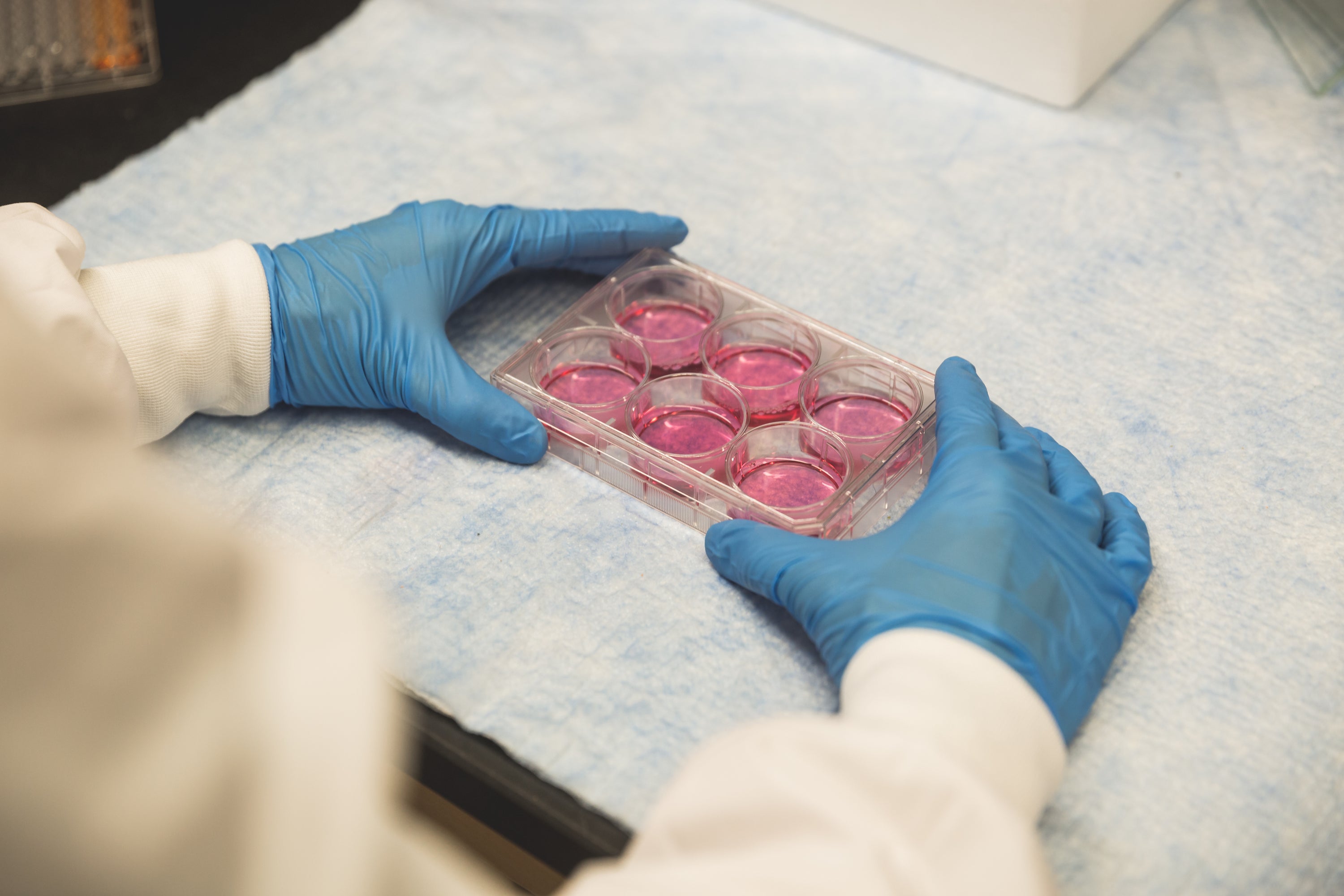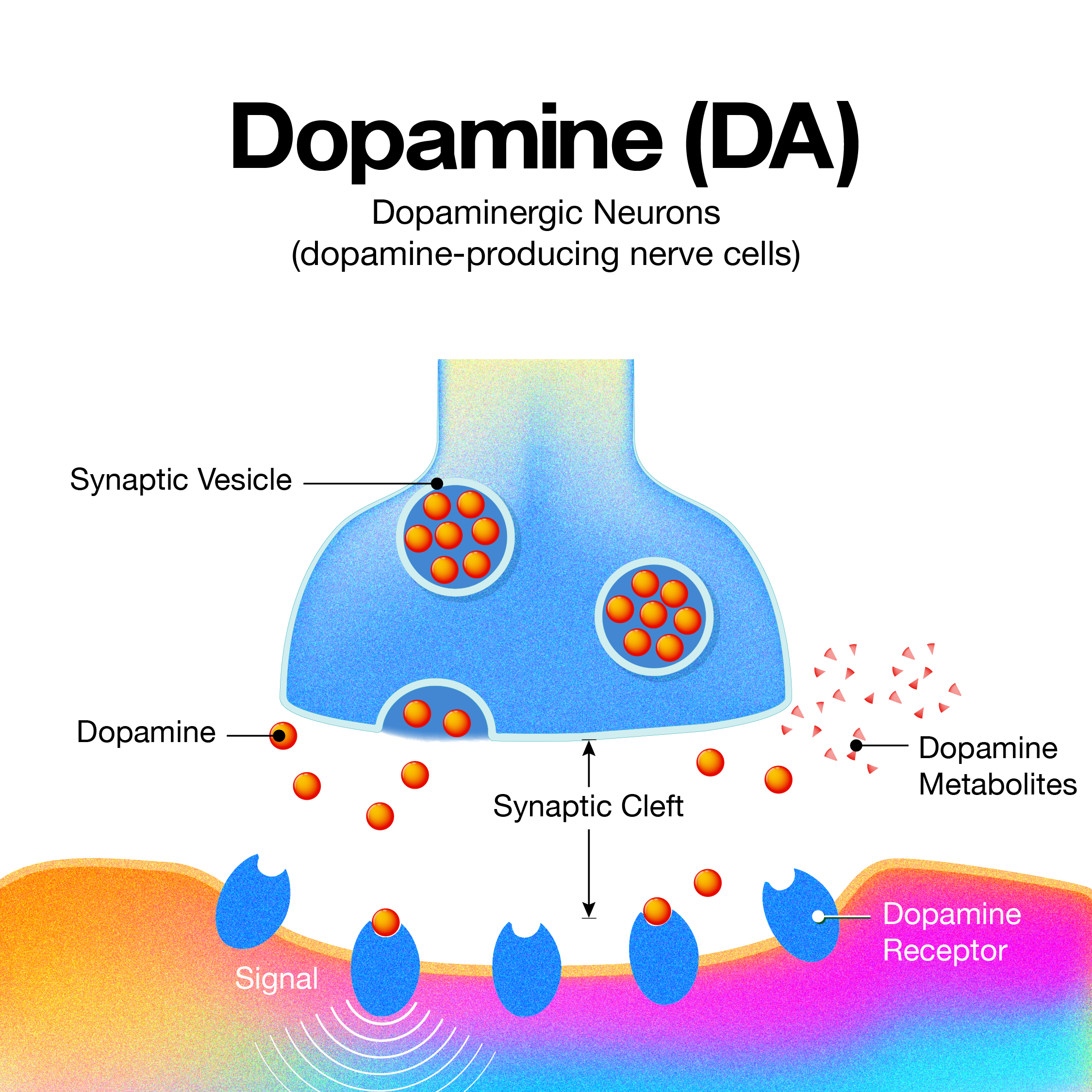
Most energy products rely on sugar, caffeine, or synthetic buzzwords to create a quick spike—and an inevitable crash.
On the other side, nootropic drinks often avoid caffeine altogether and fall short on real-world impact.
At Klar, we saw the gap and decided to build something that works with your brain and your body—without the compromises.
Klar isn’t hype. It’s function that feels good.
Our Research Philosophy
Our formula wasn’t designed in a marketing room. It started with deep research into the neuroscience of energy, focus, and hydration. We examined the roles of key neurotransmitters like Dopamine, Norepinephrine, and Acetylcholine, and built Klar to actively support those systems.
We don’t throw trendy ingredients at the label—we select for synergy, efficacy, and everyday usability.
Every ingredient in Klar was chosen for a reason: to help you perform, recover, and stay clear-headed in real life.
No gimmicks. Just a smarter, cleaner path to energy.

Energy + Hydration Ingrdient Selection Strategy
We began our product development process with an examination of the physiological mechanisms underlying energy & focus.
Energy & Focus at a Physiological Level
At a physiological level, feelings of energy and focus are affected by a multitude of systems all intricately tied to the activity of neurotransmitters within the brain. For the purpose of this overview we'll primarily be focusing on Dopamine, Norepinephrine, and Acetylcholine - neurotransmitters we wanted to modulate when developing the product.
Dopamine (DA)
Arguably the most discussed neurotransmitter today, Dopamine (DA) plays a critical role in attention and focus levels, motivation and reward processing, movement, and mood regulation, and even working memory and executive function (planning, decision-making, and problem solving). DA plays a crucial role in regulating focus and motivation by incentivizing us to pursue rewards and engage in "challenging" goal-directed behavior, particularly when anticipating pleasurable outcomes in the future.
Dysfunction in the dopamine system can have significant negative implications for focus and cognitive function. For example, mental conditions characterized by low dopamine levels, such as attention deficit hyperactivity disorder (ADHD) or Parkinson's disease, often manifest with symptoms of poor concentration, impulsivity, and difficulty initiating or sustaining tasks. In individuals with ADHD, the diminished dopamine activity in certain brain regions impairs the ability to maintain attention and regulate behavior effectively.
Norepinephrine (NE)
Norepinephrine (NE) - structural siblings with Epinephrine (AKA Adrenaline) plays a crucial role in the sympathetic nervous system. In the brain, NE focuses attention, increases arousal and alertness, and even enhances formation and retrieval of memory.
Imbalances in the NE system have been associated with a range of cognitive dysfunctions, including anxiety, problems with focus, and "brain fog"
Acetylcholine (ACh)
Acetylcholine was the first neurotransmitter ever discovered by Nobel Laureate, Otto Loewi in 1921. ACh functions as a chemical messenger that allows neurons to communicate with each other. In the brain, ACh impacts attention and focus levels and contributes significantly to processes related to learning and memory.
ACh is instrumental in orchestrating synaptic plasticity, the brains ability to adapt and form new connections in response to experiences and stimuli.

Problems to Solve
We analyzed the shortcomings of energy products currently on the market and identified a few problems we could strive to remedy:
1. Most traditional energy products take a reactive approach to combating fatigue, relying heavily on the effects of caffeine as the primary ingredient. Caffeine functions by blocking adenosine receptors in the brain - a neurotransmitter responsible for feelings of relaxation and fatigue. By inhibiting adenosine from binding to its receptors, caffeine effectively prevents the sensation of tiredness for the duration of its effects.
Through the addition of nootropics, we can attempt to modulate systems within the brain that directly impact DA, NE, and ACh levels - thus, actively enhancing cognitive function, not just avoiding fatigue.
2. Functional energy and Nootropic products often struggle with the same one-sided approach that traditional energy products do - they include functional ingredients that enhance focus and energy levels, but shy away from caffeine and b-vitamins. Many of these products adopt a "down with coffee/caffeine" rhetoric.
We love caffeine and don't believe it needs to be a polarizing issue. Our goal is to create a best of both worlds approach, something that amalgamates the strengths of both paradigms, and taking the most effective tools from each.
3. Hydration is a key factor in optimal energy levels often overlooked by products in the space, we wanted to incorporate a full-spectrum electrolyte complex that wouldn't just be another few buzzwords on the ingredient list, but instead an advanced hydration system that would be strong even as a standalone product.
Ingredient Selection Process
With these pain points in mind, we set out to identify ingredients for a comprehensive energy, focus, and hydration formula that would actively enhance cognitive function - here's what we came up with:
Natural Caffeine
As we previously discussed - caffeine works as an adenosine antagonist, blocking adenosine from binding with its receptors (Receptor Types A1 and A2a) reducing the sensation of tiredness. When caffeine does this, it also can also enhance DA signaling in the brain by blocking its reabsorption. This is incredibly significant for our formula's synergistic approach, working directly with more dopaminergic nootropics to promote optimal dopamine levels. (Volkow et al., 2015)
L-Theanine
L-Theanine is a widely-used amino acid often paired with caffeine that's been proven to mitigate the potentially adverse effects of the stimulant such as jitteriness and anxiety. L-Theanine has also been shown to enhance cognitive function by modulating brain Serotonin, Dopamine, and GABA levels (Sohail Ortiz et al., 2021). In recent studies, L-theanine has also been proven to have favorable effects on cardiovascular health and protective properties for the liver and kidneys. (Li et al., 2022)
L-Tyrosine
L-tyrosine is a precursor for the catecholamine neurotransmitters (Dopamine, Norepinephrine, and Epinephrine) meaning it's a building block of both dopamine and norepinephrine leading to enhanced cognitive performance, particularly in short-term stressful and/or cognitively demanding situations when DA and/or NE is temporarily depleted. (Jongkees et al., 2015) L-tyrosine is really our secret weapon ingredient, directly impacting the availability of neurotransmitters that have massive implications on mood, focus, and the body's ability to react to stress.
Taurine
Taurine is an extremely popular ingredient in traditional energy drinks, and has historically received a bad rap for a pretty funny reason. Once speculated to come from the testicles of bulls, Taurine is an amino sulfonic acid that naturally occurs in the body that helps regulate minerals and supports the general function of the nervous system. Taurine has also been proven to have significant synergistic effects with caffeine, showing enhanced efficacy when co-administered as opposed to individual administration. This combined supplementation has been shown to augment both cognitive and athletic performance. (Ozan et al., 2022)
Vitamin B Stack
We chose to use Vitamin B1, Vitamin B3, Vitamin B6 (as Pyridoxine HCl), and Vitamin B12 (as Methylcobalamin) as our B-vitamin stack. B-Vitamins act as coenzymes and support every aspect of cellular physiological functioning, including major functions within the brain and nervous system. (Hanna M et al., 2022) B-vitamins are critical to the synthesis of neurotransmitters and aid with converting the food you consume into useable energy.
Alpha-GPC
Alpha-glycerylphosphorylcholine (Alpha-GPC) is a precursor to ACh - the chemical messenger we mentioned earlier that impacts cognitive performance, learning, and memory. Studies have also demonstrated Alpha-GPC's ability to augment physical performance after only 6 days of supplementation. (Bellar D et al., 2015)
Rhodiola Rosea
Rhodiola Rosea is an adaptogenic herb with a long history of use in traditional medicine. It's uses include enhancing mental and physical performance, decreasing symptoms of fatigue and depression, increasing work productiviy, and providing antioxidant and inflammatory effects. (Ivanova Stojcheva E et al., 2022)
Advanced Electrolyte Complex
We wanted to create an advanced hydration stack that could be strong even as a standalone product - for this we combined three complex electrolyte profiles: Himalayan Pink Salt, Sea Salt, and Potassium Chloride. Himalayan Pink Salt is a beautiful mineral-dense salt found in the Himalayan Mountains of Pakistan. This salt boasts a number of unique benefits stemming from a wide range of trace minerals like magnesium, calcium, and potassium. It also contains a marginally reduced sodium content compared to standard table salt, all while introducing a complex (and cool looking) electrolyte profile to our formula. Sea Salt is made from evaporating ocean water and has uses dating back to prehistoric times. Sea Salt boasts more trace minerals than your standard table salt and adds a familiar yet potent electrolyte profile to our formula. Last but not least we have Potassium Chloride, the final electrolyte to close out our formula. Rich in Potassium - an essential mineral needed by all tissues in the body that plays a critical role in nerve function.
- Volkow ND, Wang GJ, Logan J, Alexoff D, Fowler JS, Thanos PK, Wong C, Casado V, Ferre S, Tomasi D. Caffeine increases striatal dopamine D2/D3 receptor availability in the human brain. Transl Psychiatry. 2015 Apr 14;5(4):e549. doi: 10.1038/tp.2015.46. PMID: 25871974; PMCID: PMC4462609.
- Anas Sohail A, Ortiz F, Varghese T, Fabara SP, Batth AS, Sandesara DP, Sabir A, Khurana M, Datta S, Patel UK. The Cognitive-Enhancing Outcomes of Caffeine and L-theanine: A Systematic Review. Cureus. 2021 Dec 30;13(12):e20828. doi: 10.7759/cureus.20828. PMID: 35111479; PMCID: PMC8794723.
- Li MY, Liu HY, Wu DT, Kenaan A, Geng F, Li HB, Gunaratne A, Li H, Gan RY. L-Theanine: A Unique Functional Amino Acid in Tea (Camellia sinensisL.) With Multiple Health Benefits and Food Applications. Front Nutr. 2022 Apr 4;9:853846. doi: 10.3389/fnut.2022.853846. PMID: 35445053; PMCID: PMC9014247.
- Jongkees BJ, Hommel B, Kühn S, Colzato LS. Effect of tyrosine supplementation on clinical and healthy populations under stress or cognitive demands--A review. J Psychiatr Res. 2015 Nov;70:50-7. doi: 10.1016/j.jpsychires.2015.08.014. Epub 2015 Aug 25. PMID: 26424423.
- Ozan M, Buzdagli Y, Eyipinar CD, Baygutalp NK, Yüce N, Oget F, Kan E, Baygutalp F. Does Single or Combined Caffeine and Taurine Supplementation Improve Athletic and Cognitive Performance without Affecting Fatigue Level in Elite Boxers? A Double-Blind, Placebo-Controlled Study. Nutrients. 2022 Oct 20;14(20):4399. doi: 10.3390/nu14204399. PMID: 36297081; PMCID: PMC9610400.
- Hanna M, Jaqua E, Nguyen V, Clay J. B Vitamins: Functions and Uses in Medicine. Perm J. 2022 Jun 29;26(2):89-97. doi: 10.7812/TPP/21.204. Epub 2022 Jun 17. PMID: 35933667; PMCID: PMC9662251.
- Bellar D, LeBlanc NR, Campbell B. The effect of 6 days of alpha glycerylphosphorylcholine on isometric strength. J Int Soc Sports Nutr. 2015 Nov 17;12:42. doi: 10.1186/s12970-015-0103-x. PMID: 26582972; PMCID: PMC4650143.
- Ivanova Stojcheva E, Quintela JC. The Effectiveness ofRhodiola roseaL. Preparations in Alleviating Various Aspects of Life-Stress Symptoms and Stress-Induced Conditions-Encouraging Clinical Evidence. Molecules. 2022 Jun 17;27(12):3902. doi: 10.3390/molecules27123902. PMID: 35745023; PMCID: PMC9228580